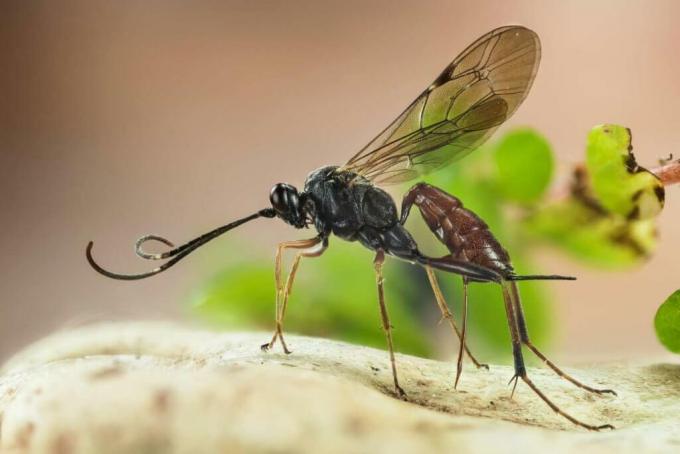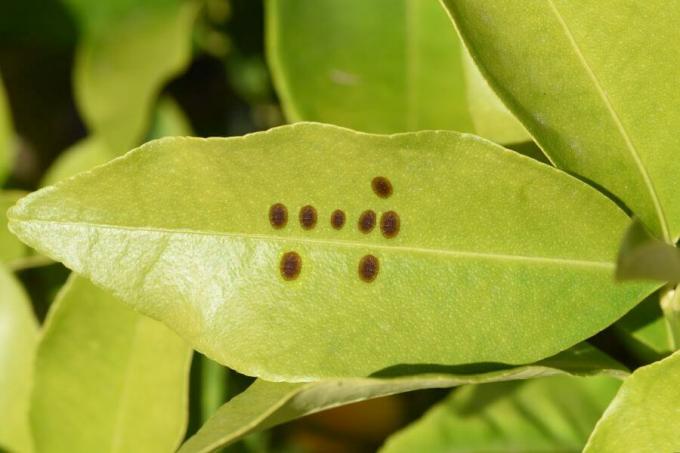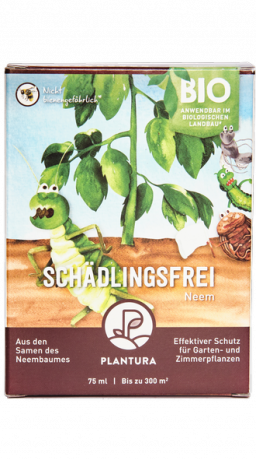The beneficial insects can be used as a natural control method against plant pests. We reveal how to successfully use parasitic wasps against aphids, whiteflies and the like.

Ichneumon wasps (Ichneumonidae) are beneficial insects that live as parasites. They lay their eggs for development in insects or insect larvae, causing them to die after the larvae hatch. As soon as all the host insects have been killed, the parasitic wasp is no longer able to stay where it is and it disappears almost unnoticed. This makes it an elegant and ecological alternative to chemical crop protection. But the use of parasitic wasps should be well prepared: The useful little helpers are very specific when it comes to the choice of their host. However, you should not be put off by the high host specificity. Most providers of parasitic wasps also provide comprehensive advice and will help you make the right choice. We will tell you in which areas and how exactly you can use parasitic wasps.
contents
- Ichneumon wasps against aphids
- Ichneumon wasps against scale insects
- Ichneumon wasps against whitefly
- Alternative control method: pest-free neem
Ichneumon wasps are a very diverse family of insects. Due to the large number of different species, parasitic wasps can also be used against various pests. They prove useful against both aphids (Aphidoidea) and scale insects (Coccoidea) and whiteflies (Aleyrodoidea), better known as whiteflies. They can be used both in closed rooms such as greenhouses or living rooms and outdoors. In closed rooms, the little helpers do not migrate so quickly, which is why their use is particularly effective here. Ichneumon wasps can be used at air temperatures of 15 to 30 °C. Therefore, the use is only recommended from late spring.
Ichneumon wasps against aphids
aphids belong to the plant lice (Sternorrhyncha) and are annoying companions in every garden. With their stinging mouthparts, aphids suck on the plant's phloem sap, which is very sugary. However, the aphids cannot fully utilize all the sugars alongside the other valuable phloem components. Therefore, they excrete most of the sugar as honeydew. This causes a sticky, shiny film on leaves or your window sill.
Although the parasitic wasp is inconspicuous at around three millimeters long, it is very effective against aphids. A female can parasitize around 500 aphids in a short time. She uses her sting to lay an egg in the previously stunned aphid. A larva then grows out of the egg, which kills the aphid as it grows – what is known as an “aphid mummy” remains.
If the aphid infestation is very widespread, the parasitic wasps are even able to individual Track down animals and parasitize them, which is why they also have a preventive character in combating them to have. However, if you have problems with a very dense infestation, it is advisable to bring in other beneficial insects such as ladybirds (Coccinellidae).

Notice: Some aphid species are "milked" by ants, meaning the ants harvest the aphids' sugary honeydew for their own nourishment. In order to protect their "herd of aphids", the ants defend their aphids against enemies such as the parasitic wasp. Some species of parasitic wasps, for example Lysiphlebus testaceipes, can imitate the smell of aphids by excreting scents, so that they are camouflaged and are not attacked by the ants.
Here is a brief overview of the most important aphid species and their respective most effective opponents:
| aphid species | Ichneumon wasp species for control |
|---|---|
| pea aphid (Acyrthosiphon pisum) | Praon volumecre |
| Green peach aphid (Myzus persicae) | Aphidius Colemani |
| Large raspberry aphid (Amphorophora idaei) | Praon volumecre |
| potato louse (Macrosiphum euphorbiae) | Aphidius matricariae |
| Large rose aphid (Macrosiphum rosae) | Aphelinus abdominalis |
| Black bean aphid (Aphis fabae) | Lysiphlebus testaceipes |
Tip: Ichneumon wasps are sold in the egg stage. The beneficial insect eggs, which are cultivated on a large scale, are applied to cardboard or small paper balls and are therefore immediately ready for application. Shipping only takes place between 5 and 30 °C and is sensibly only processed on a few fixed days of the week in order to always guarantee fresh parasitic wasps. The fact that you may have to wait longer for your little animal can therefore be a sign of quality! As soon as the beneficial insects have arrived, you should let them out of their packaging as soon as possible. In any case, we recommend handling the little helpers carefully so as not to crush them. Also note: depending on the infestation severity and room situation - i.e. outdoor, conservatory or greenhouse - a repeated order at intervals of two weeks is necessary to permanently decimate the plant lice.
Ichneumon wasps against scale insects
scale insects (Coccoidae) afflict your plants by sucking out the plant sap. The males are usually winged and appear as solitary individuals. The females of most species, however, have a eponymous flat and shield-shaped body. The females of the scale insects (Coccidae) have a very strongly arched back and therefore have a rather spherical body. Mealybugs (Pseudococcidae), also known as mealybugs, are also among them Scale insects, but have a conspicuous white "hair" instead of the shield-shaped body wax threads. Female scale insects live in colonies and diligently suck on the phloem of the plant. They also lay their eggs under their shield on the leaves of the infested plant, from which new adult pests later develop.
Since the scale insect family includes many different species, it is important to choose the right pest control helpers. The parasitic wasp Metaphycus flavus for example, feeds on eggs and young scale insect nymphs. She also lays eggs under scale insect nymphs, from which parasitic wasp larvae hatch. These penetrate the pest and help you get rid of the scale insects. In turn, new beneficial insects develop in the parasitized cocoons. The parasitic wasp species with the greatest successes in controlling scale insects is Metaphycus flavus. But other parasitoid species such as Coccophagus lycimnia and Aphytis melinus show good results.

Important: If you have trouble accurately identifying the small parasites, vendors of beneficial insects offer support. The host specificity of the beneficial insects is the decisive factor in whether control is successful or not.
Ichneumon wasps against whitefly
The term "white fly" does not actually mean a fly at all, but is a trivial name for some representatives of the whitefly (Aleyrodidae). The main pests referred to as whitefly are the cabbage whitefly (Aleurodes proletella) and the greenhouse whitefly (Trialeurodes vaporariorum). Whiteflies are one to two millimeters in size, their wings are covered with white wax dust. The larvae of the pest are particularly feared in greenhouses, but can be brought under control by using beneficial insects. Due to the spatial limitation, the parasitic wasps are prevented from migrating to other hosts and can therefore be used in a very targeted manner. It is important that the temperature in the greenhouse is optimal. Depending on the parasitic wasp species, the ideal temperature is between 18 and 22 °C and is crucial for the development of the parasitic wasp population. By airing the room regularly, you can ensure that the little helpers feel comfortable.
The proves to be particularly valuable with a view to combating whitefly parasitic wasp species Encarsia formosa. It is doubly useful: older developmental stages of the larvae are parasitized and serve as hosts for the growing next generation of Encarsia formosa. Young developmental stages are used by adult parasitic wasps as food.

Summary: Use parasitic wasps against plant lice
- Ichneumon wasps can be used against various plant lice, namely aphids, scale insects and whiteflies.
- Ichneumon wasps only parasitize certain lice, which is why you should make sure that the parasitic wasp matches the pest when used in a targeted manner. The dealers of beneficial insects will be happy to advise you on this.
- It can be used indoors and outdoors, although indoor use is much more effective.
- The air temperature should be between 15 and 30 °C for successful use.
- Temperatures between 18 and 22 °C and regular airing ensure that the parasitic wasps stay healthy and busy.
Alternative control method: pest-free neem
In the case of a heavy infestation with whiteflies, scale insects or Aphids on houseplants beneficial insects such as parasitic wasps are sometimes not sufficient. The targeted use of beneficial insects is often difficult in the wild, too. In these cases we recommend the use of a biological pesticide. Such biological pesticides protect the naturally occurring beneficial insects in the field, which means that they can continue to "work for you" as a preventive measure instead of being harmed. Unfortunately, this does not usually apply to synthetic plant protection products against plant lice. You should make sure that you do not use beneficial insects and pesticides at the same time, including biological agents.
A very effective way to naturally combat aphids, scale insects or whiteflies is to use neem-based preparations. The neem oil from the seeds of the neem tree contains the active ingredient azadirachtin, which is ideal for use against plant lice. Our Plantura Organic Pest Free Neem is based on this valuable neem oil and offers you an opportunity to fight the pests purely with plants. The active substance is taken up by the lice when sucking on the plant and causes a quick stop of the sucking activity. The development of the larvae is disturbed, so that the entire population is damaged and disappears. Plantura organic pest-free neem is simply mixed with water and the emulsion is sprayed onto the affected plant. Precise information on the dosage and use of Plantura Organic Pest Free Neem can be found on the product packaging. You can use organic pest-free neem both indoors and outdoors - it is not dangerous to bees. Please note that you use our organic pest-free neem as specified in the application recommendation. Therefore, please read the package insert before use.

Plantura Organic Pest Free Neem
Highly effective & natural spray
against aphids, potato beetles & Co,
from the seeds of the neem tree
Tip:Plantura Organic Pest Free Neem not only works excellently against aphids, scale insects and whiteflies, but also helps you Fight spider mites naturally.
More exciting information about the topic "Control aphids“ can be found in our special article.
...and receive concentrated plant knowledge and inspiration directly in your e-mail inbox every Sunday!
